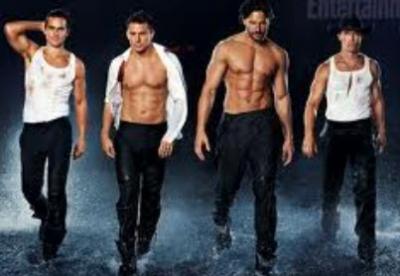Watching Magic Mike on video was a surprise but not in a good way. From the hype it seemed like a romantic R-rated film about male strippers. It wasn’t like that. It was a character study about a man trying to rise above his scummy job.
 The studio synopsis says, “a dramatic comedy set in the world of male exotic dancers, Magic Mike is directed by Academy Award winner Steven Soderbergh and stars Channing Tatum in the title role” as it “follows Mike as he takes a young dancer…and schools him in…partying, picking up women, and making easy money.” Box Office Mojo lists production costs as a mere $7 million and after 10 weeks at the theatres, it had made $117 million in box office receipts.
The studio synopsis says, “a dramatic comedy set in the world of male exotic dancers, Magic Mike is directed by Academy Award winner Steven Soderbergh and stars Channing Tatum in the title role” as it “follows Mike as he takes a young dancer…and schools him in…partying, picking up women, and making easy money.” Box Office Mojo lists production costs as a mere $7 million and after 10 weeks at the theatres, it had made $117 million in box office receipts.
Though $110 million is a large profit, the devil is in the details. People who read Variety‘s Top 100 film charts know how to read a key figure,“% change.” By week 2, Magic Mike had dropped 60 percent from the prior week. Even worse, by the end of a three day weekend, the hype and star power was gone (led by “People’s Sexiest Man Alive” Channing Tatum and Matthew McConaghey). Women slowed their ticket buying after the first weekend’s word of mouth kicked in. Even director Steven Soderburgh, the force behind Sex Lies and Videotape, Ocean’s Eleven, Erin Brockovich, and Traffic, couldn’t make it a worthwhile viewing experience.
What went wrong? It is simple. The target audience is women who want to see handsome actors take off their clothes and hopefully, also see a rewarding romantic story. Yet the cinematic concept of “the male gaze” is in full force. Instead of fulfilling female fantasies, this film becomes a character study by men, of men, who waste their lives and appear to have little regard for women. The male screenwriter and male director portray women negatively and insult their target audience.
Admittedly, I never went to a male strip club but I lived next door to two dancers from the original Chippendales. The guys were intriguing, entrepreneurial actors trying to succeed in the Hollywood audition mill. The Chippendale’s night shows fit perfectly between their acting classes, auditions, and day jobs. As for girlfriends, any lady I saw one day was replaced a month later.
Mike, the central character, dreams of being a custom furniture maker in Tampa. Until he can live his dream, he takes odd jobs and saves for the future. As the film opens, Mike finds “The Kid,” a shy 19 year old at a construction site and then the two meet again at an exclusive club that night. Mike talks the shy guy into flirting up two pretty young girls. As his friend chats with them, Mike convinces the girls to join them later at a male strip club. They all go to the strip show, where there are chunky, scrawny, and shorter male strippers. The only one resembling my tall, muscular but not muscle bound former neighbors was Tatum as Magic Mike.
During the show, Mike and the other strippers lift up women from the audience and carry them to the stage where the men writhe on top of them, most often with the men’s barely-clothed genitals in the women’s faces. After the show, the men appear to have paired off with patrons they just met. In the morning, Mike returns The Kid to his sister’s apartment, where Mike encounters his plain, skeptical, watchful sister.
The film depicts male strippers as low-lives who openly devalue women in their lives. “Dancers” buy and sell drugs, have trouble with bad guys, and fight with each other.
At the end, The Kid and Magic Mike must each make very different choices about their futures. Somehow, after a few walk-and-talk discussions about life, The Kid’s straight-laced sister opens herself to a romance with Magic Mike, even after seeing him use women. I didn’t buy it. The writer created a last moment juxtaposition with Mike’s job as Satan in one ear and The Kid’s sister as the angel in his other ear. I didn’t believe that hint of romance was more than a plot convenience; the story didn’t show why she would fall for a bad boy, even for a possibly repentant bad boy.
The most important thing missing from the film was kissing. One character explained dancers don’t kiss the patrons “because you may get herpes.” Just ask yourself, of the romances in your life, what lover do you remember fondly and not recall every moment of their best kiss? The lack of kissing was symbolic of the emotion, passion, and warmth missing from this movie.
This move was bad because men wrote a film about men who disdained women, without regard that the target audience was women wanting a racy romantic story. The trailers teased what the audience wanted but the film didn’t deliver. Worse yet, I didn’t care about any of them. I rented the movie expecting steamy men and instead found depictions of unstable guys who wouldn’t get a second look from me.
Other reviewers took turns making potshots at the awfulness of this film. I heard there will be a sequel. For that rumor, I ask, “Why?” I hope a second iteration of this cinematic crash down will consider respecting women, the most likely ticket buyers.
Joan Stuller has an M.A. in Radio TV Film from California State University Northridge and spent ten years working for media companies in Hollywood.
